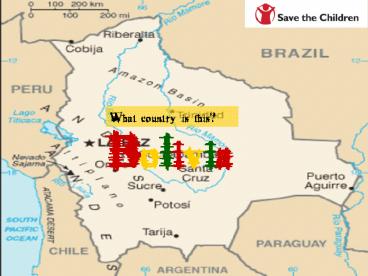Bolivia - PowerPoint PPT Presentation
1 / 14
Title: Bolivia
1
What country is this?
Bolivia
2
Where is Bolivia?
Which countries border it? What continent is it
in? What is the climate like? What language do
they speak? What size is the population? What
currency do they use?
3
Which countries border it? Peru, Brazil,
Argentina, Paraguay, Chile What continent is it
in? South America What is the climate like? Ave.
Summer temperature 22c Its quite rainy in
Summer Ave. Winter temperature 15c Its very
bright and sunny in Winter What language do they
speak? Spanish, Quechua and Aymara What size is
the population? 9 million less than London What
currency do they use? Bolivianos about 15bs to 1
4
- Bolivia has a huge natural gas field, the
second largest in the continent (after
Venezuela). - We use natural gas to produce electricity in
most countries. It is the cleanest fossil fuel,
so its use is increasingly popular.
5
It also has more than 70 of the worlds iron and
magnesium.There are rich agricultural resources.
It should be economically stable.
6
- But it is the
- poorest country in South America. 66 of the
population live - in poverty
- (90 in cities). 800,000 children and
adolescents work - (21 of the working population).
7
- Bolivia has been getting poorer since the
Eighties. There are several likely reasons for
the economic situation there has been
governmental corruption, economic crises in
neighbouring countries
a crackdown on Bolivian cocaine production and
Western authorities have been allowed to exploit
Bolivian resources (in the 90s the government
sold 50 of each public entreprise).
8
Llallagua
- Llallagua is in the Highlands in the South-West
of Bolivia. It is home to 30,000 people. - 70 of those people live below the poverty line.
- 46 of the population have no access to
electricity and 78 have no sanitary facilities.
- Life expectancy is around 48 years old.
- 40 of people work in mining, despite how
dangerous and unpleasant it is. - Many children have to work to support their
families. Some work in the mines, many sell
things in the street or shine shoes. - Llallagua is a traditional and religious area.
9
Santa Cruz
- Santa Cruz is Bolivias most industrialised
region and people have the highest average wages
in the country. Many people move here from other
parts of the country. It has become a modern,
International city. Despite the benefits of
economic growth, there are downsides, like
pollution, drug addiction and crime. - Santa Cruz is a city of contrasts. Many young
people still have to work. It is common to work
in the market, pushing around heavy wheelbarrows,
which damages their backs and hands. They often
sleep in the market, covering themselves with
cardboard to keep warm and to hide their
belongings. Window washers have to dodge the
dangerous, aggressive traffic.
10
As a result of the tough economic conditions,
many children and teenagers have to work. They
often work as fruit and vegetable sellers, shoe
shiners, waiters, farm hands and car washers.
- Some also have to perform the worst jobs of
mining, sugar cane farming and sexual
exploitation. The children and adolescents work
for as many as 18 hours a day in order to help
their families eat.
11
- Leoncio 14 My friend Rafael shines shoes. He
wants to earn lots of money. But he is a good
kid, and so are all the kids in the park, because
we work hard and to bring home money for food and
to buy our things.
12
- Through close cooperation with local
organisations, Save the Children is trying to
help Bolivians to improve their situation. - What has been done so far?
- By getting to know the young workers and talking
to them, organisations called NATs teach them how
to defend their rights.
13
- The NATs build their self-esteem through
individual and group counselling sessions. They
encourage children to protect themselves. - They give their members a jacket to identify them
as protected by the association. - It is vital that this is a collective movement,
so that bosses change their practices, rather
than sack the courageous workers who stand up for
themselves and replace them with exploitable
ones.
14
NATS will only allow children to join if they
study as well as work. This way they ensure that
young pupils dont miss out on their education,
which could bring them out of their difficult
situation in the future. Members are also
permanently excluded if they get in a fight.
- Unfortunately there are not enough NATS to
protect all the children and the workers have to
pay in order to join the groups.































